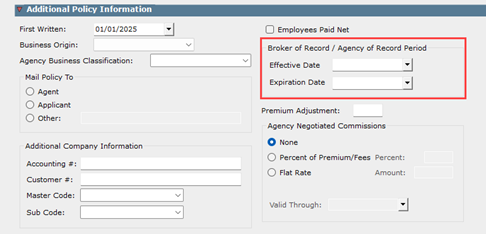Broker or Agency of Record Commission
With the Broker or Agency of Record (BOR/AOR) Commission feature, you can now record the start- and end-dates when a policy is transferred to your agency mid-term through a Broker or Agency of Record (BOR/AOR) change. This record of dates helps the system automatically assign both personnel and agency commissions, based on the effective and expiration dates you have entered.
In the Additional Policy Information section within a policy, there are two dates for the broker or agency of record period, the Effective Date and the Expiration Date.

These dates determine the active period of the BOR/AOR. If the selected expiration date is outside of the policy term, the BOR/AOR period will persist in the renewal policy. Once the expiration date has been achieved within a policy term, the dates no longer appear on renewal policies.
The BOR/AOR dates are useful for tracking policies as well as automatically determining commissions received by both the agency and its employees.
New Business
When BOR/AOR dates are active for the new business term of the policy, all commissionable entities (employees, brokers and agencies) have commissions automatically set to 0 [zero] when invoicing the policy. These numbers can be overridden by either entering a negotiated commission on the policy *, or by manually updating the invoice commission.
Renewal Business
When the BOR/AOR dates are still active when the policy is renewed (i.e., the BOR/AOR expiration date occurs after the new policy effective date), the following commissions will be applied:
-
The agency commission will either default to the renewal commission entered in the company setup, or to what was sent with the downloaded statement.
-
Employees will either default to the new business commission entered in the employee setup or, if a commission template is applied to the policy, they will receive a commission from term 0 [zero] of the commission template.
-
Brokers will default to the new business commission as entered in the broker setup.
If the renewal policy is downloaded from the company, BOR/AOR dates will carry over to the download, presuming they are still active.
When BOR/AOR dates are no longer active at the time the policy is renewed, the following commissions will be applied:
-
The agency commission will either default to the renewal commission entered in the company setup, or to what was sent with the downloaded statement.
-
Employees will either default to the renewal commission as entered in the employee setup or, if a commission template is applied to the policy, they will receive a commission based on the renewal/term count on the policy.
-
Brokers will default to the renewal commission as entered in the broker setup.
If negotiated commissions are entered into the policy for agency, employee or broker, these commissions will override any default commission setups for the commissioned entity.*
|
* NOTE: For additional information on adding negotiated commission for employees and the agency, please review the following Help articles: Working with Policy Personnel and Policy or Submission. |
Broker or Agency of Record dates can apply to both agency-billed and direct-billed policies. If these dates are on direct-billed policies that are billed through direct-bill entry statements, a BOR Eff Date column has been added to show the presence of BOR/AOR dates.

If a company sends through a downloaded statement that includes an agency commission for a policy with a BOR/AOR date in the system, the downloaded commission will override the 0 [zero] when the statement is created.
Updates have been made to both Global Change for Personnel single employee change and import processes to accommodate broker or agency of record commissions.
If BOR/AOR dates exist on a policy that is undergoing a global personnel change, rather than defaulting setup commission to the new employee, the new employee will receive a commission based upon the term the BOR/AOR dates are on.
For example, if the policy is new business, the new employee will receive 0 [zero] commission. If the policy is renewed, the new employee will receive their new business commissions.
Q: "I added BOR/AOR dates to a new business policy. Why are the commission amounts not defaulting to zero upon invoicing?"
A: There are several aspects that can cause this situation:
-
If a policy was billed before adding the BOR/AOR dates, all future invoices will default to the prior billing commissions until the policy is renewed. If the BOR/AOR dates persist after the policy expiration date, the correct commissions will take effect upon policy renewal.
-
If a policy has negotiated commission entered for any combination of the agency, broker, or employees, this commission takes.
----------------------------------------------------------------------------------------------------------------------------------------------------
Q: "I added BOR/AOR dates to my new business policy and did not remove the policy commission template. When I renewed the policy, the BOR/AOR dates were still active and the commission template term "0 [zero] commissions" was applied to all employees. When I renewed the policy for a second time, the BOR/AOR dates were still active and the same commission template term (0 commissions) was applied again to all employees. Why did the term commission not change when the policy was renewed?
A: The renewal/term count on a policy will stay at term 0 [zero] for as long as BOR/AOR dates are active. The system continues to apply new business commissions until the BOR/AOR dates are removed. The renewal/term count is still an editable field for anyone who has access; however, it is important to note that editing this field will affect commissions that are applied to employees on the policy.